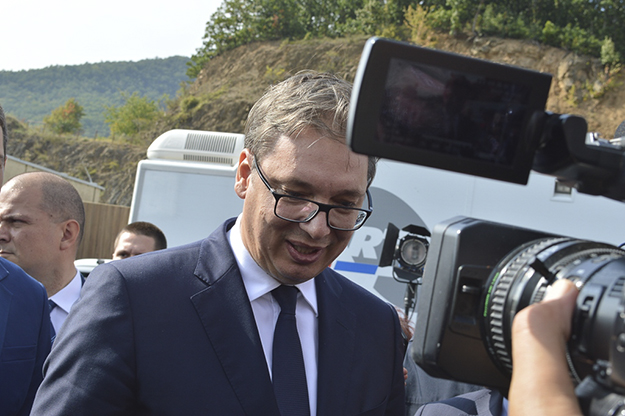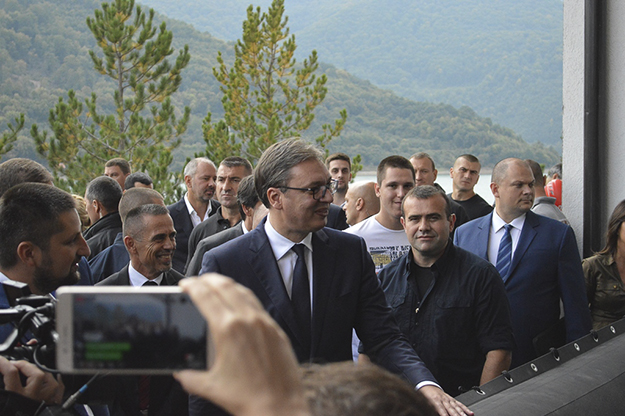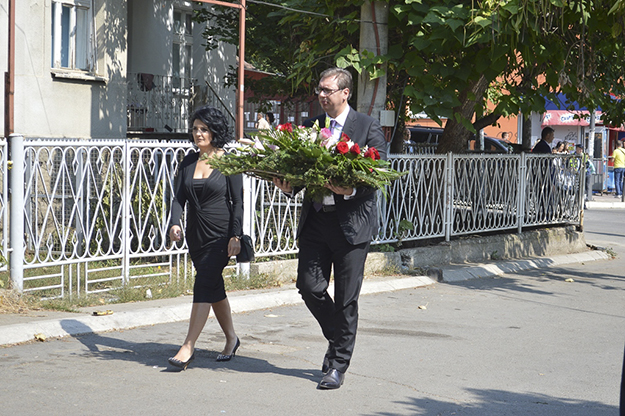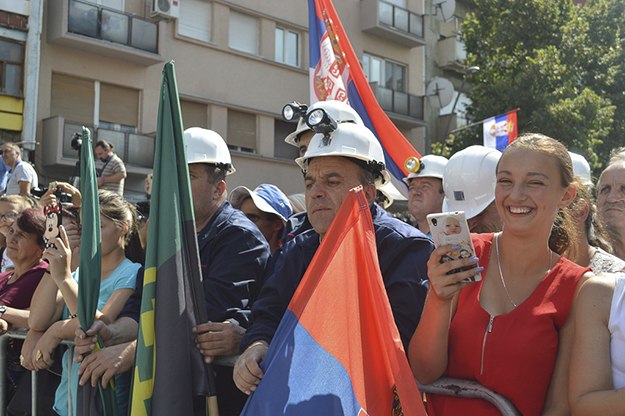Even after Serbian President Aleksandar Vučić’s visit to Kosovo, citizens have no clear answer on what border delimitation in the talks between the Serbian and Kosovo presidents actually means.
Some will remember his visit for the atmosphere it created in Mitrovica, for the Serbian flags and infrastructural projects. Others will remember the mentions of Milošević, or the incidents in Skenderaj where protesters blocked the road preventing the Serbian president from visiting, or the conciliatory messages delivered in his speech. Some will simply remember how hungry they were, as shops and restaurants closed down during Vučić’s address.
One thing is for sure, if local administration and public enterprises in northern Kosovo worked as hard every day as they worked in the days prior to Vučić’s arrival, North Mitrovica, Zvečan, Leposavić, and Zubin Potok would probably look like the most well regulated municipalities in Kosovo. Naturally, this isn’t the case.
In the course of preparations for welcoming Vučić, a lot of pressing requirements which hadn’t been addressed in years were implemented, including completing the asphalt road between Zvečan and Mitrovica. Those who have crossed this route previously will remember it for its potholes and the entry into North Mitrovica, where a large bulge was formed by a landslide that had settled on the lower part of the road.
For days, one could see workers working on tidying up the road. If you had put your head out the window, you could have heard that they spoke Albanian, and seen Kosovo license plates on the construction machinery and trucks. While the main road was being fixed, citizens were required to use a narrow, potholed mountain pass in order to travel to Mitrovica and back. This road has not been fixed. The quality of the work on the main road will be seen in the coming days and months.
What was also visible during preparations for Vučić’s arrival was the replacement of the Serbian flags that are flown everywhere in northern Kosovo. Instead of the old ones, faded from exhaust fumes, new flags were placed both on the road from Jarinje to North Mitrovica, as well as in the places that Vučić visited. The most noticeable were two big flags in Zubin Potok: one on a rock not far from the Gazivode lake dam, and another on the dam itself.
Some citizens spoke about the atmosphere preceding the visit reminding them of the film “Gori vatra” (“The Fire in Burning”). Set in post-war Bosnia, the film depicts a small settlement preparing to welcome then US president, Bill Clinton. Everybody is engaged in organizing a welcoming ceremony for the president, while a local female singer sings: “He will bring coexistence and democracy to our gardens! Dawn is rising above Tešanj! Welcome, dear president! The sun is shining above Tešanj! I am rejoicing for your visit!”

Photo courtesy of Ivan Mitic.
Others compared it with another film, “Three Tickets for Hollywood,” in which euphoric preparations are underway for the welcoming ceremony for Yugoslav President, Josip Broz Tito. The main character of this satirical movie is Gavrilo Milentijević, who leads the organization of the preparations and goes as far as to imprison his own brother as an enemy of the regime in order not to spoil the ideal welcoming ceremony for the president.
What both films have in common is that neither presidents ever arrive, and preparations were futile. In this last part, the North Kosovo movie is different in that Vučić actually came.
Although the danger of his absence still hung in the air right up until his arrival. The day before Vučić arrived in Kosovo, a new round of dialogue between the Serbian and Kosovo presidents was scheduled to take place alongside representatives from the EU. However, the trilateral meeting didn’t take place, with Thaçi and Vučić instead holding separate meetings with High Representative of the European Union for Foreign Affairs and Security Policy, Federica Mogherini.
The public is still not clear over how the tensions that led to the Serbian president deciding not to meet his Kosovo counterpart escalated. Some have suggested that statements made by President of the Kosovo Assembly, Kadri Veseli could have been to blame, after Veseli said that approval for Vučić’s visit may be removed. However, if we go back, it is easy to find many inflammatory statements from politicians on both sides, that have not affected the Brussels meetings.
Regardless, Belgrade media close to the ruling structures declared that Vučić’s visit to Kosovo was in question due to messages arriving from Prishtina. While citizens wondered whether Vučić would come, and what it was that he wanted to achieve with his arrival or non-arrival, preparations for the welcoming ceremony continued.
On the eve of the visit, when confirmation finally arrived at 1:30 a.m., workers of the utility service enterprise washed the podium on the Car Lazar Square in Mitrovica, and the stage on which Vučić would hold his speech was prepared.

Photo courtesy of Ivan Mitic.
The first day of Vučić’s visit had similar elements as the meeting with citizens in Laplje Selo in January this year, but this time the event took place in a more sophisticated manner. New jobs, investments in Trepča and Gazivode, as well as the opening a business forum in Leposavić were promised, as the Serbian president visited a rural household not far from Lešak.
There were people with different backgrounds along the road: children, women, old, young, educated, uneducated, farmers, directors, workers, businessmen. Vučić was doing what he likes most: representing himself as superman who solves all problems. In fact, throughout his visit he did what he liked most: marketing and campaigning.
He remembered Fikret, his army pal, whom he met in Mitrovica, and, as the media reported, he informally talked about his military days and memories. Even though Fikret is a Gorani, and not Albanian, the marketing goal of this encounter seems clear: to represent himself as a pacifist and someone who cooperates, and seeks reconciliation.

Photo courtesy of Ivan Mitic.
The speech given in front of the citizens of North Mitrovica on Sunday (Sept. 9) was described by Vučić beforehand as the most important speech of his life, while some commentators had denounced it, labelling it as his own Gazimestan speech — alluding to Milošević’s speech in Gazimestan in 1989.
In the end, some termed yesterday as the ‘anti-Gazimestan,’ saying that it was an ordinary speech, and not anything novel. Others have found fault with the way in which he referred to Slobodan Milošević.
Regardless, Vučić reached his objective. His speech was the central topic for two days in Serbian, Albanian, and some international media. For two whole days he was present, though how successful this all was remains to be seen. But one thing can be concluded: He addressed his speech to everyone. Serbs, Albanians, the international community, but also different layers of the Serbian society, from the radicals to the liberals.
“I will start from the most difficult part,” he began his speech. “From everything we believed in, everything we dreamt about, from big illusions we had about each other, illusions that we are superior, numerous, and almost eternal. That the others are weaker, more stupid, and less capable than us.”


